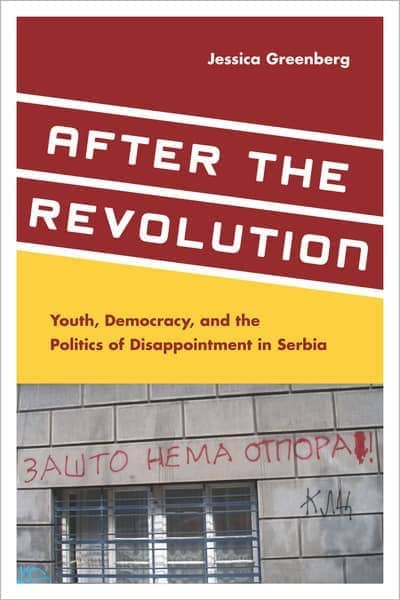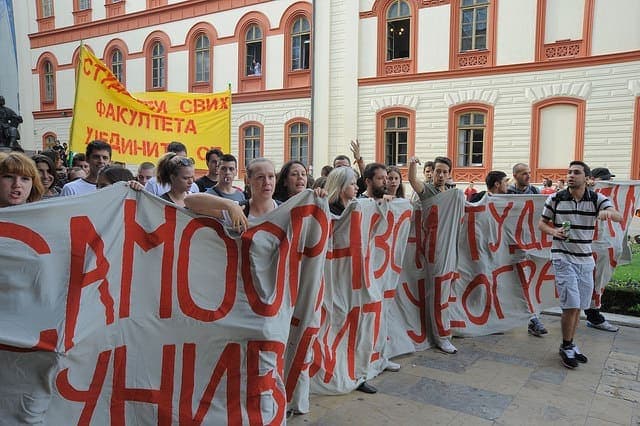What is the relationship between democracy, development, disappointment, and failure? Is it possible to learn something about ‘democracy proper’ from an Eastern European context, fraught with problems characteristic for post-socialist and post-conflict transformations? Framing disappointment and failure as inseparable from democratic practice, After the Revolution ethnographically explores how young people in Serbia in the past two decades pursued socio-political transformation through public protests, university reforms, democratic institution building, and other forms of activism. Greenberg’s interlocutors faced “the disappointments of impossible revolutions and unrealizable futures” (p. 39), while working out how to represent themselves to various audiences in Serbia and abroad, how to gain legitimacy as representatives of the wider student population, how to organise relations among competing student representatives, how to cooperate with university management and administration, and so forth.

Instead, the book approaches the students’ efforts as already legitimate enactments of democratic practice, in a particular way and on a particular scale.
Such an analytical choice illuminates that disappointment is not just a postsocialist political modality, but a constitutive part (and something like a fuel) of democracy more generally. Instead of assuming that failures are the result of political work in an ‘exceptional’, transforming, post-war, post-socialist, Balkan context that is moving towards democracy, After the Revolution frames disappointment and failure as inherent to democratic politics as such. The notion that “postrevolutionary democracy is made both through and despite such disappointments” (p. 21) suggests that democracy is a never-ending pursuit, a performative category that comes out of continuous repetition.
Chapter 1, Against the Future, explores the period after the fall of Slobodan Milošević in 2000, during which student activists pragmatically focused on the present moment, abandoning utopian hopes in some undetermined future where things ‘will be better’. They refused teleological narratives and the revolutionary zeal, while incorporating disappointment, contingencies, uncertainties, and contradictions of social change “into the very model of action itself” (p. 49). The same pragmatic commitment to the present moment shaped students’ ideas about political representation and effective public protesting, which are in the focus of Chapter 2, Embodying Citizenship. The difficulty of organising mass student rallies led them to redefine protests as gatherings of ‘quality citizens’ – concerned, informed and dedicated representatives of the student population. Chapter 3, Revolution and Reform, discusses how students at the university further experimented with different forms and meanings of citizenship, reinstating contradictions between bureaucratic hierarchies on the one hand, and self-managed and self-regulatory actions on the other. Such contradictions, which are inscribed into the ‘heart of modern citizenship’ (p. 88), diluted potential criticisms of the Bologna reform that has introduced marketisation and neoliberalisation of higher education in Serbia. In Chapter 4, The Ethics of Knowledge, we learn how students utilised expertise as a way “to be actively engaged but not ‘political’” (p. 124). In the Serbian context, the ‘rule of experts’ was sometimes used for the grassroots leftist, and sometimes for the elitist conservative, goals. As Chapter 5, We Have to be Politicians, suggests, in the world of student activists in Serbia, standardised procedures have become almost a kind of cosmology about truth.

Unravelling the tension between legitimacy, authenticity, and self-interest that was played out in students’ worlds, After the Revolution offers an account of the strength of proceduralism. Some ambiguities of who represents whom, on what grounds, and to whose benefit could be traced back to the socialist Yugoslav legacies, but some are built into representative forms of democracy itself. In order to be politically active in the midst of such ambiguities, the students turned to expertise, professionalism, and institutionalisation, as “narrative and practical strategies through which [they] reconfigured a political field of action outside the logics of failed expectations and totalizing revolutionary transformations” (p. 49). Greenberg discusses with great care diverse contexts of students’ engagement, cautiously analysing their reasoning and strategies made and remade in the midst of complex entanglements between powerful political actors, hope, failures, and pragmatism.
Ethnographically demonstrating that democracy as a practice exists on different scales of action and meaning, Greenberg focuses on the conditions of solidarity and politics of the here-and-now.
The image of democracy that arises from After the Revolution is not one of a goal, an achievement, or a possession. Instead, Greenberg demonstrates that “the practice of democracy is shot through with contradictions and compromises in the present” (p. 39), inherently incomplete and never quite achieved, and that perhaps it should not be thought of as an engagement that can have a final form. This work suggests that democratic politics lies precisely in the process of dealing with failures, in navigating a difficult socio-political terrain while attempting to reach democracy. The forms of agency created from the politics of disappointment discussed in After the Revolution are directly relevant for thinking about politics in the former Yugoslavia and postsocialist Eastern Europe, as well as about other groups and actors that are regularly faced with political disillusionment. The imminent disappointments of democratic forms of rule should not lead us to abandon “the possibility of practicing or analysing politics, only the investment in the stability of political meaning” (p. 187). In this way, After the Revolution suggests that disappointment may give rise to the politics of practical hope.
**************
Featured photo by Freedom House (flickr, CC BY-NC 2.0)



